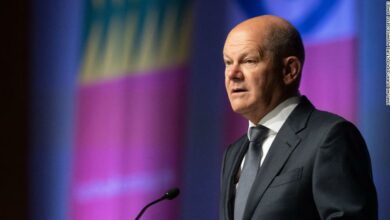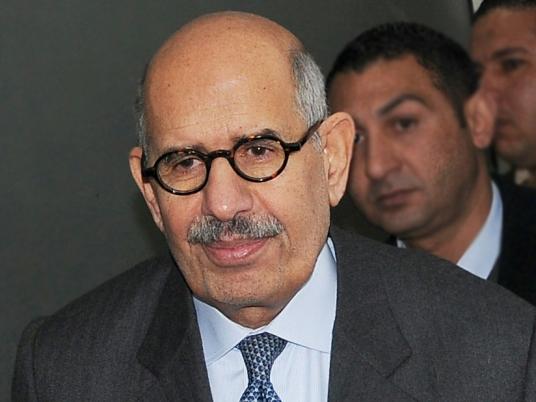What are Mohamed ElBaradei’s political objectives? Is he a charismatic leader who represents an Egyptian national consensus in favor of political change? Or is he a reform advocate who seeks to build and represent a democratic constituency that is clearly distinguished from other forces calling for "political reform" or "change"?
Indeed, ElBaradei wavers between these two visions. At times, he views democratic transition as an outcome of every day popular struggles for diverse, or even contradictory, demands. He defends Egyptian peoples’ right to independent self-organization and insists that a truly democratic discourse should reflect such diversity. At other times, he advocates a patriarchal vision of mass movements, typical to his liberal modernist antecedents, that treats people as catalysts for "change" but not necessarily partners in shaping the direction of this change.
In my view, if ElBaradei pursues the latter approach and insists on presenting himself as the voice of Egypt’s national consensus his campaign will fail.
A closer look at ElBaradei's sources of inspiration may shed some light on the way he perceives himself and his role in Egyptian politics. In his interviews and public appearances, ElBaradei makes constant references to India’s struggle against British colonialism and to the fight against apartheid in South Africa as historical precedents for what he aims to achieve in Egypt. Moved by the twin examples of Gandhi and Mandela, ElBaradei envisions the creation of a broad-based popular movement capable of rising above internal differences and contradictions that will eventually choose him as its leader.
But will this approach really give way to an effective democratic struggle? And are the historical examples that ElBaradei summons relevant to Egypt’s current political situation?
In the cases of India and South Africa, the existence of a broad popular alliance was not a prerequisite for anti-colonial struggle, it was an outcome. Both Gandhi and Mandela were well aware of social differences–based on class, race, gender, and caste–within the body of their imagined nations and the challenges these posed for mass political mobilization. Moreover, these differences continued to shape the histories of post-independence India and post-Apartheid South Africa. ElBaradei is most likely aware of these histories, though when invoking these examples he often overlooks their conflict-ridden pasts and instead chooses to highlight the role mass movements played in the collective struggle for democracy.
This brings us to the next point: Neither the Indian nor South African examples represent a democratic transformation of the kind Egypt needs today. Rather, these were experiments in constructing modern nations, of which democracy would be one important marker of national progress. Leaders like Gandhi and Mandela were not just party activists or hopeful revolutionaries. They were statesmen in every sense of the word–moral and intellectual leaders who enjoyed a level of popular legitimacy that raised them above everyday politics. With all due respect, ElBaradei does not have any of these attributes. Nor is this kind of leadership needed in Egypt's present context.
Clinging to these older anti-colonial models will only foster illusions that may hamper our ability to formulate realistic strategies for democratic change.
What if we look elsewhere, perhaps in more recent history, for better examples?
The democratization wave that swept much of the world in the 1980s succeeded in many places because those calling for democracy employed new political and organizational tactics for building political coalitions and selecting its leaders, different from those used in the heyday of anti-colonial nationalism. These shifts were most clearly seen in Latin America.
Perhaps Egypt is better compared with cases like Chile and Brazil in the 1980s, both of which underwent a democratization process involving different stages of popular struggle that ultimately brought down military dictatorships and reintroduced political pluralism. In this comparison, the historical referents for ElBaradei are not Gandhi and Mandela, but Patricio Aylwin in Chile and Fernando Cardoso in Brazil. Democratic transformation in these contexts consisted of a variety of particular struggles pulling in different directions–for example, the struggle of trade unions and social movements against the neoliberal measures adopted by the former dictatorships. At the time, these struggles were different from conservative elites' calls for a return to democracy and the old multi-party systems that preserved their hegemony for decades.
Democratic reform was eventually introduced through a series of steps aiming to reach a middle ground among different social and poltical tendencies, not through a sudden popular uprising or mass civil disobedience. None of the democracy proponents in these countries ever aimed to bring emerging and variegated political movements under unitary nationalist tutelage.
The Latin American democratization process did not rely principally on charismatic leaders; Chilean and Brazilian reformists needed to agree upon and implement a concrete plan of action with defined goals more than they needed to command a populist appeal. Aylwin and Cardoso did not attempt to transcend ongoing social conflicts at that time. On the contrary, they emerged as leaders of clearly defined political blocs–Christian Democratic in the case of Aylwin and Social Democratic in the case of Cardoso.
There are indeed key differences between the struggles for democracy in Latin America and Egypt. First, Egyptian social movements–unlike their Latin American counterparts–continue to have an elusive presence in Egyptian politics where they do not act as strong independent players. Second, Egypt’s experience with partisan politics, in many respects, pales in comparison to that of Latin America. Third, Islamist movements, which represent a tremendous political force in the Middle East, do not seem as keen on promoting democracy as were Christian Democratic parties in Latin America.
Notwithstanding these differences, the lesson ElBaradei can learn from Latin America is that he will have trouble leading a democratic transformation unless he builds a strong pro-democracy camp that is clearly distinguished from other Egyptian groups calling for reform. Otherwise, he risks turning ordinary people away from the crucial debate about the kind of political future Egyptians want to build. Doing so will only add to the general state of political apathy and reinforce the misguided impression that ElBaradei is a national savior, rather than an advocate, like many others, who wants to bring about democratic change.
Amr Abdulrahman is a doctoral student at Essex University. He writes for El-Bosla magazine where an extended version of this article originally appeared in Arabic.




